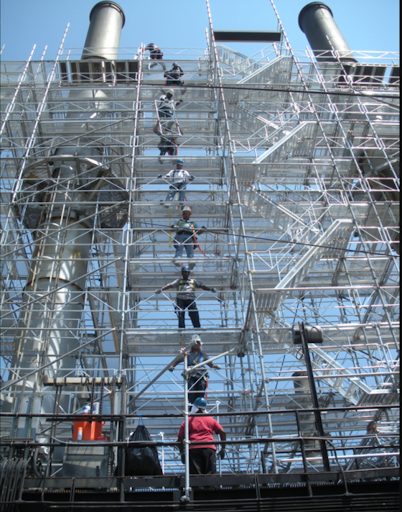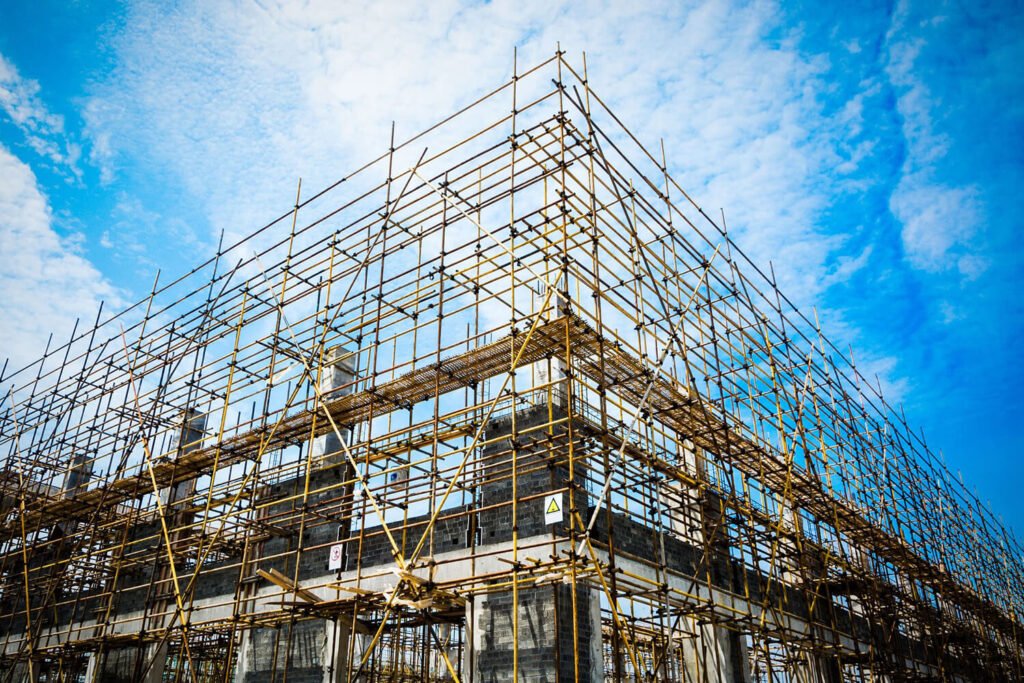Professional Scaffolder Surrey: Your Trusted Partner for Safe Installations
Professional Scaffolder Surrey: Your Trusted Partner for Safe Installations
Blog Article
Discovering the Various Types of Scaffolding Used in Construction Projects
The building sector depends greatly on various kinds of scaffolding to meet details project needs, each offering distinct benefits and applications. Traditional framework scaffolding provides a durable structure for general tasks, while put on hold scaffolding is necessary for work on high-rise frameworks.

Standard Structure Scaffolding
Typical structure scaffolding is just one of one of the most extensively made use of approaches in the building and construction sector as a result of its robustness and versatility. This system contains horizontal and vertical frameworks that are constructed to develop a stable system for workers and materials. The main elements include vertical messages, horizontal journals, and angled braces, which together give a strong structure that can sustain substantial tons.
Among the crucial advantages of typical framework scaffolding is its flexibility to different construction tasks, ranging from household buildings to large industrial structures. The modular style permits easy setting up and disassembly, making it effective for both long-lasting and short-term jobs. Additionally, the system can be tailored in height and width, suiting different building layouts and site problems.
Safety and security is extremely important in scaffolding applications, and conventional framework systems are furnished with guardrails and toe boards to avoid falls and ensure worker protection. Regular inspections and adherence to safety guidelines are important in keeping the honesty of the scaffold (Scaffolding). Overall, conventional framework scaffolding remains an essential option in the building and construction sector, giving a reputable platform for labor and improving general job effectiveness

Suspended Scaffolding
Put on hold scaffolding provides a distinct solution for building and construction tasks that need access to elevated surfaces, particularly in scenarios where standard framework scaffolding might be unwise. This sort of scaffolding is generally suspended from the roof covering or top levels of a framework, using a system of ropes, systems, and wheels to develop a working area that can be readjusted to numerous elevations.
Among the key benefits of suspended scaffolding is its adaptability. It can be quickly rearranged or decreased to suit changes in building and construction requirements, making it optimal for tasks such as window installment, façade job, and upkeep on high-rise structures. Additionally, the minimal impact of put on hold scaffolding enables much better use ground space in city environments, where area is frequently minimal.
Safety is a vital factor to consider in the usage of suspended scaffolding. Proper rigging and anchoring systems have to be employed to guarantee security and prevent mishaps. Operators needs to additionally be learnt the safe use this devices. Generally, put on hold scaffolding offers a efficient and effective solution for accessing hard-to-reach areas in various building and construction scenarios, improving both efficiency and safety on site.
System Scaffolding
System scaffolding, typically considered as a contemporary service in the scaffolding industry, contains pre-engineered parts that can be swiftly set up and adjusted for different construction projects. Scaffolding. This kind of scaffolding is identified by its modular layout, which enables adaptability and effectiveness on work sites, accommodating structural needs and various heights
Generally made from high-strength steel or aluminum, system scaffolding supplies improved longevity and security. The components consist of upright messages, horizontal journals, and angled dental braces, which interconnect firmly, guaranteeing a durable structure. The design typically includes standardized fittings, streamlining setting up and disassembly processes, thereby reducing labor time and expenses.

Rolling Scaffolding
Moving scaffolding is a functional choice to typical set scaffolding, designed for mobility and ease of usage on building and construction websites. This find more info kind of scaffolding includes a system sustained by frameworks with wheels, permitting employees to easily move it as needed. The mobility feature considerably boosts productivity, as it decreases downtime connected with constructing and disassembling dealt with scaffolding.
Commonly constructed from lightweight products such as aluminum or steel, rolling scaffolding offers a tough yet mobile service for tasks calling for regular repositioning - Scaffolding. It is especially beneficial in jobs such as paint, drywall installment, and electric work, where access to numerous elevations and locations is necessary
Safety is paramount in rolling scaffolding design, with features such as securing wheels to avoid unintentional movement when being used, and guardrails to secure workers from drops. Furthermore, many designs are flexible in height, suiting various task needs.
Cantilever Scaffolding

The design of cantilever scaffolding normally includes utilizing brackets or arms secured to a structure or structure, enabling the system to extend outside safely. Safety and security is extremely important; hence, these scaffolds need to be engineered to endure various lots and ecological conditions. Normal scaffolding procedure assessment and maintenance are important to ensure architectural stability and worker safety and security.
Cantilever scaffolding is preferred for its flexibility and efficient use area, making it a popular selection in metropolitan environments where space restraints prevail. Moreover, it promotes much easier access to high altitudes, eventually adding to the general performance of building and construction jobs. Similar to all scaffolding types, appropriate training and adherence to safety and security requirements are critical for employees making use of cantilever scaffolding.
Final Thought
Traditional frame scaffolding offers stability, while put on hold scaffolding supplies versatility for elevated jobs. System scaffolding facilitates fast setting up, and rolling scaffolding boosts flexibility for varying job atmospheres.
Traditional structure scaffolding supplies a strong this contact form foundation for general jobs, while suspended scaffolding is crucial for job on skyscraper frameworks.Moving scaffolding is a flexible option to conventional fixed scaffolding, developed for movement and ease of use on construction websites. As with all scaffolding kinds, appropriate training and adherence to safety and security standards are critical for employees making use of cantilever scaffolding.
Standard framework scaffolding supplies stability, while put on hold scaffolding supplies convenience for raised jobs. System scaffolding assists in fast assembly, and rolling scaffolding improves wheelchair for varying work atmospheres.
Report this page